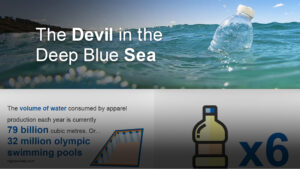The global fashion industry supports millions of jobs around the world and generates revenues worth billions but this success comes with a damaging environmental cost.
Analysis from the Ellen MacArthur Foundation reports that if nothing changes, the fashion industry will be responsible for a quarter of total carbon dioxide emissions by 2050. However, it’s not all doom and gloom, as consumer sentiment, new technologies and innovative products are paving the way to a more sustainable future for fashion.
Analysis from the Ellen MacArthur Foundation reports that if nothing changes, the fashion industry will be responsible for a quarter of total carbon dioxide emissions by 2050.
Recycling has become an ever-growing issue. Around the world, global environmental protection agencies are gaining publicity, receiving increased media coverage of their recycling campaigns and efforts. However, despite these measures, recent reports indicate concern over the current global situation associated with the world’s plastic use.
According to a 2017 Guardian article, plastic bottle usage is expected to surge to more than half a trillion sold annually around the world by the end of the decade. The demand is equivalent to approximately 20,000 bottles bought per second or over 1 million plastic bottles per minute. Reducing marine pollution is among the United Nations Sustainable Development Goals, and the United Nations Environmental Program launched its Clean Seas campaign last year to cut down the use of microplastics and single-use plastics. In an attempt to combat this rise in plastic waste, companies are working to incorporate these types of recycled materials into garments. Known as sustainable fashion, this growing design philosophy’s goal is to create a system that is supported indefinitely in terms of human impact on the environment and social responsibility. Coats is paving the path in recycled threads for apparel with our product range including Coats Epic EcoVerde und Coats Gramax EcoVerde. We also manufacture recycled metal and plastic zips, Opti M EcoVerde und Opti S EcoVerde.
Coats EcoVerde is a revolutionary product range featuring 100% recycled premium sewing threads. As the only globally available 100% recycled range of fit-for-purpose premium corespun and textured sewing threads on the market today, EcoVerde offers the same proven level of performance as the industry’s leading non-recycled threads.
Coats EcoVerde is a revolutionary product range featuring 100% recycled premium sewing threads.
The process begins with used plastic (PET) bottles being collected from consumers, sorted, cleaned, chopped into flakes and then melted down and extruded into the fibre and filaments from which EcoVerde sewing threads are made. Because it consists entirely of recycled plastic fibres, Coats EcoVerde has a significantly lower footprint than virgin fibres.
By recycling plastic bottles, we are reducing the amount of toxins that are released into the air when burning plastic waste. According to The Earth Project, a significant amount of petroleum is needed for making new plastic products, and around 40% of the petroleum can be reduced by recycling old and discarded plastic. The benefits of recycling plastic also includes a reduction in the emission of greenhouse gases. In a study by the United States’ Environmental Protection Agency, the average family can reduce their carbon emissions by 340 pounds by recycling their plastic waste instead of sending it to landfills.
According to the Textile Exchange’s 2017 ‘Preferred Fiber and Materials Market Report’, there is a growing demand for recycled polyester and nylon among sustainability front runners. In their PFM Benchmark Survey in which 95 companies participated, 47,407 MT recycled polyester fibre was used and 2.9 billion bottles were diverted from the landfill. The Textile Exchange community, spearheaded by members of the rPET Working Group, are supporting a commitment to grow the use of rPET in recognition of the environmental impacts of using virgin PET. Each brand that has signed up has agreed to at least a 25 percent increase in rPET usage by 2020. This is also in evidence in recent reports by www.just-style.com that adidas aims to only use recycled polyester in its shoes and clothing by 2024, and that Decathlon has pledged to reduce its impact by using sustainable polyester products in its textiles sold in France by the end of 2021.
Other retailers and manufacturers are also stepping up to the plate with the likes of Asos, Levi’s, H&M, John Lewis and Kering introducing sustainable materials and campaigns. Through our EcoVerde product range, Coats plans to remain an integral part of the recycled thread industry and to work with industry to develop further innovations and collaborations.
Get in touch with a technical expert to find out how Coats EcoVerde can help improve your sustainable credentials and save our oceans.


